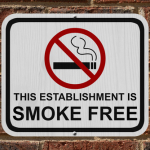No Time like the Present for Going Tobacco-Free
 Community mental health and addictions providers are uniquely positioned to act as agents of change in addressing tobacco use disparities by offering tobacco cessation screening, treatment and tobacco-free environments to those with behavioral health disorders; and supporting clients with environments that incentivize healthy behaviors. With communities primed to tackle tobacco use, many community mental health and addictions providers are recognizing that more needs to be done–offering cessation services and implementing tobacco-free policies on their campuses to do just that.
Community mental health and addictions providers are uniquely positioned to act as agents of change in addressing tobacco use disparities by offering tobacco cessation screening, treatment and tobacco-free environments to those with behavioral health disorders; and supporting clients with environments that incentivize healthy behaviors. With communities primed to tackle tobacco use, many community mental health and addictions providers are recognizing that more needs to be done–offering cessation services and implementing tobacco-free policies on their campuses to do just that.
CommuniCare, an organization serving communities along the shoreline and in central Connecticut, contracted with 16 agencies across the state to implement cessation services and tobacco-free policies. Their journey to going tobacco-free/implementing tobacco free policies began with Dr. Doulgas Ziedonis of the University of Massachusetts Medical School. Using the Addressing Tobacco Through Organizational Change (ATTOC) model, CommuniCare changed their entire culture. > > Read more
Smokers More Prone to Anxiety and Depression
A new study shows that cigarette smokers have a 70 percent greater risk of anxiety and depression than do non-smokers and ex-smokers. These findings contest the commonly held belief that smoking helps relieve stress. Read more here.
Social Injustice: Study Finds Tobacco Advertising More Frequent in Low-income Communities
 Tobacco advertising is widespread in urban areas with high concentrations of racial/ethnic minorities and low-income households. Recent research in Philadelphia shows that tobacco advertising was much more likely in stores that accept SNAP and WIC benefits than in other tobacco-selling stores, thereby targeting low-income individuals and families who are already dealing with major health disparities. The study investigated the relationship between the amount and type of tobacco advertisements on tobacco outlets and the outlet type and location.
Tobacco advertising is widespread in urban areas with high concentrations of racial/ethnic minorities and low-income households. Recent research in Philadelphia shows that tobacco advertising was much more likely in stores that accept SNAP and WIC benefits than in other tobacco-selling stores, thereby targeting low-income individuals and families who are already dealing with major health disparities. The study investigated the relationship between the amount and type of tobacco advertisements on tobacco outlets and the outlet type and location.
Cancer Risk Factors and Prevention Strategies Address People with Mental Illness
Evidence suggests that people with serious mental illnesses may be up to 2.6 times more likely to receive a later stage cancer diagnosis, largely due to a lack of available screening options, lifestyle risk factors, and frequent co-morbidities. A recently published paper aims to increase awareness of cancer risk factors and implications of employing innovative health promotion and cancer-prevention strategies among people with serious mental illness.
Minnesota Senators Introduce Legislation Addressing Health Disparities in African-American Communities
Deputy Majority Leader Sen. Jeff Hayden (DFL-Minneapolis) and Sen. Bobby Joe Champion (DFL-Minneapolis) have introduced legislation to address alarming social injustice as evidenced by health disparities affecting the African American community. The authors have introduced three major pieces of legislation, which include SF1701 requiring health insurance coverage for colorectal cancer screenings for high risk populations, and SF1836 studying and providing recommendations to decrease menthol cigarette usage by African Americans. Read more here.
What Do Motivational Interviewing, Nicotine Replacement Therapy & Telephone Interventions have in Common?
They all show promise with regards to smoking cessation! Recent studies published in the journal Nicotine and Tobacco Research look at treatment options among adults with serious mental illness who smoke. This study suggests that an adaptation of Motivational Interviewing may be a promising approach for increasing quit attempts. Another study examined the efficacy of nicotine replacement therapy (NRT) plus either a face-to-face or predominantly telephone delivered intervention for smoking cessation and cardiovascular disease risk reduction. Want to learn more about Motivational Interviewing (MI)? Check out the National Council’s newest MI consulting line!
Tobacco Use among Teens Declines, yet E-Cigarette Use Soars: Why?
A recent CDC report found that the use of e-cigarettes among middle and high school students tripled over just one year. This spike in use illustrates the first time since 2011 that e-cigarette usage rates have surpassed conventional tobacco products usage rates. Some states have passed legislation to establish minimum age requirements for the purchase of e-cigarettes.
What We Really Know about Electronic Cigarettes
This research brief from RTI International, Exhaled Electronic Cigarette Emission: What’s Your Secondhand Exposure?, examines what is currently known about electronic cigarettes and the problem, the source-exposure-dose paradigm applied to electronic cigarettes and future research needs.
Could Raising Minimum Purchasing Age for Tobacco Prevent Future Use?
The Institute of Medicine recently released a report on the public health implications of raising the minimum age to purchase tobacco to 19, 21, or 25 years. The report concludes that raising the minimum age of legal access (MLA) would likely prevent or delay a young person’s initiation of using tobacco. Click here to access the report and an introductory slide set.
NEW Toolkit Available: Implementing Tobacco-Free Campus Policies
This toolkit – developed by the Behavioral Health and Wellness Program – was created for a broad range of public health organizations and treatment facilities, particularly those serving persons with mental illnesses and addictions. The materials are intended for staff with organizations that are considering or implementing tobacco-free policies. Click here to gain access to the toolkit, which includes organizational readiness assessments, implementation instructions, and cessation service guidance during policy implementation.
The Tobacco Epidemic Among People with Behavioral Health Disorders: Fact Sheet & Resources
The Smoking Cessation and Leadership Center recently published a factsheet full of statistics related to tobacco use by persons with mental illness and addictions. Access the fact sheet here.
New Posters, Fact Sheets, & Reference Guides Available Through CDC Tips Campaign
 The CDC launched the 2015 wave of its successful Tips from Former Smokers campaign on March 30, 2015. New advertisements have been broadcast across the country. Local physical and behavioral healthcare providers can augment the campaign in their own communities by using CDC’s Tips ads or other tobacco-related media. The CDC provides materials to answer questions about the Tips ads—and guidance on how to start a conversation about quitting.
The CDC launched the 2015 wave of its successful Tips from Former Smokers campaign on March 30, 2015. New advertisements have been broadcast across the country. Local physical and behavioral healthcare providers can augment the campaign in their own communities by using CDC’s Tips ads or other tobacco-related media. The CDC provides materials to answer questions about the Tips ads—and guidance on how to start a conversation about quitting.
- Partner pages offer posters, FAQs about quitlines, fact sheets for patients, a pocket-sized brief intervention card for office visits, a quick reference guide on treating tobacco dependence, and much more.
- Webinar being conducted by Faiths United Against Tobacco on May 13 at 1pm and 7pm for faith leaders across the country about the new TIPS from Former Smokers ads.
Grants for Community College Tobacco-Free Policies
Legacy is now accepting applications for 2015 grants to public community colleges across the country. These grants support efforts to advocate for, adopt, and implement a 100% smoke-free or 100% tobacco-free policy. Grants are $5,000 per year, with up to two years of funding. The deadline for applications is August 6, 2015.
Minority and Young Smokers Drawn to Menthol, Yet No Ban Enacted
Menthol tobacco products are consumed at significantly high rates by African Americans and other minority populations, and are particularly appealing to young people who smoke. While restrictions have been enacted to ban flavored tobacco products, the FDA has yet to act on banning menthol. The Tobacco Control Legal Consortium released a toolkit of resources to restrict the sale and consumption of menthol flavored tobacco products at the state and local level. The toolkit features case studies, lessons learned, and tips for regulation.
Implementing Tobacco-Free Policies in Substance Use Treatment Facilities
This study examined the prevalence of and factors (psychological climate for change and staff attributes) related to indoor and outdoor tobacco bans for patients, employees, and visitors in U.S. substance use disorder treatment programs. It found that all psychological climate for change factors (perceived program support, perceived tobacco culture, and tobacco ban beliefs) were significantly related to the implementation of systemwide tobacco-free policies.
Real-World Tobacco-Free Implementation Experiences from California Behavioral Health Facilities 
Between baseline and follow-up, this study found a decrease in the proportion of organizations at the precontemplation or contemplation stages of change and twice as many organizations at the action and maintenance stages of change, when assessing readiness to implement tobacco control strategies. Read the full study here.
New Recommendations for Workplaces Protecting Clients and Staff from Secondhand Smoke Exposure
A new report from the National Institute for Occupational Safety and Health (NIOSH) recommends that all workplaces become tobacco-free and that employers make tobacco cessation programs available to workers. These latest recommendations, which also encompass the use of e-cigarettes—are aimed at protecting workers from the occupational hazards of tobacco and the effects of secondhand exposure to tobacco smoke and emissions from e-cigarettes. The recommendations were issued in a recent Current Intelligence Bulletin, which can be found here.
State Health Insurance Marketplace Plans Could Help More Smokers Quit
Under the Affordable Care Act (ACA), state health insurance marketplace plans are required to provide tobacco cessation resources as a free essential health benefit, including access to FDA-approved tobacco cessation medications. However, a new American Lung Association report – State Health Insurance Marketplace Plans: New Opportunities to Help Smokers Quit – found that the majority of these plans are not actually providing the required coverage for smoking cessation as required by the ACA. The report illustrates the need for more transparency in health plan informational materials so that individuals in need of tobacco cessation resources are able to identify which health plan will best fit their needs.
- Utilizing Tobacco Cessation Tools Webinar June 23, 2:30-4pm ET – Register today!
- Alcohol Use & Cancer Webinar July 7, 2:30-4pm ET – Register today!
In Case You Missed It!
Did you miss the April 28th webinar – Implementing Cancer Screening & Referrals within Community Behavioral Health Organizations? We archived the session so you can access the materials at any time! Here’s what attendees have been saying about the presentation:
Visit the National Council’s webinar archives website to listen to the recording and access a PDF version of the slides!
Unable to attend this year’s National Council Annual Conference in Orlando, FL? No worries – All of the session handouts are available online, including the materials from these sessions:
- “Tobacco-Free Living for Persons with Mental Illnesses and Addictions”
- “Bridging Public Health — Behavioral Health Partnerships”
- “Transcending Boundaries: Lessons Learned Building a Community-Based Prevention Network”
#####
About the Network
The CDC-funded National Behavioral Health Network for Tobacco & Cancer Control, run by the National Council for Behavioral Health in partnership with the Smoking Cessation Leadership Center, Behavioral Health and Wellness Program and Centerstone Research Institute, is 1 of 8 CDC National Networks to increase capacity and infrastructure to address tobacco and cancer disparities in priority populations. Jointly funded by CDC’s Office on Smoking & Health and Division of Cancer Prevention and Control, the National Behavioral Health Network focuses on providing Network members with resources to support their efforts in eliminating cancer and tobacco disparities among people with mental illnesses and addictions. Our hashtag, #BHtheChange, encourages consumers, clinicians, advocates, and other stakeholders to join a conversation about how each and every one of us can “be the change” in behavioral health. > > Read more


